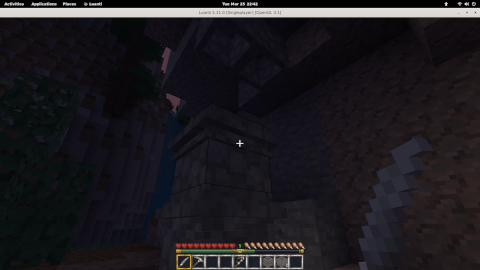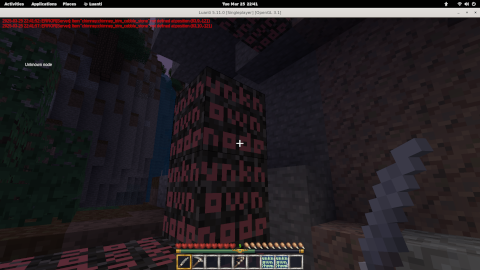Luanti - The Little Engine That Absolutely Can
- Game
- Luanti
- Type
- Original
- Languages
- C++, Lua
- Source
- GitHub
- License
- LGPL-2.1, various
Introduction
Luanti is an open source voxel game engine, started in 2010 to replicate the then-alpha Minecraft's capabilities, but has long since evolved into a platform used by hundreds of distinct user-created games.
The engine provides a wide array of fundamental capabilities, such as rendering, networking, portability, etc. and delegates the creative aspects to users by providing a robust lua API, and a documentation website packed with everything you need to create your own voxel-based games. An official service for hosting your creations is also provided, allowing players to download it directly through the game client.
Where To Play
The best place to start is the official website luanti.org, which provides prebuilt binaries for all major platforms. The source code is also available on GitHub, and the latest releases ready to build from the included dependencies.
Interestingly, the README also refers to instructions for running a server in Docker, a tool normally used for web development, but useful for maintaining portability.
"Luanti"?
The name “Luanti” is a play on words from the Finnish word “Luonti” meaning creation, and the Lua programming language.
The engine, which was formerly known as Minetest, underwent a name change in late 2024 - This blog post explains the reasoning. Due to the extended time under the older name, many references to it exist, but they both refer to this engine. For clarity, this article will use the newer name.
What Can You Do?
Luanti divides the various mods into three categories: "Games", "Mods" and "Texture Packs".
Games are, as the name implies, stand-alone experiences with their own mechanics, themes and resources - they need not conform to the classic Minecraft formula of survival sandboxes, as many instead focus on delivering new and original experiences using the voxel engine as a base.
Games are mutually exclusive - as each game can fundamentally alter the behavior of the world, two or more together isn't allowed - that's where mods come in.
Mods are alterations to games built with Luanti's tools, adding or altering small (or not so small) aspects, and often, multiple mods can operate at the same time, assuming they don't operate on the same aspect of the game. Mods for mods may also be possible, though none have been found at this time. Be sure to enable the desired mods on a world-by-world basis once installed.
The final category is "Texture Packs" - while texture packs seem to be usable with any game and set of mods, only one texture pack can be enabled at a time. This is likely a for practical reasons. Texture packs can be switched on and off as desired.
What Can't You Do?
Once you've used a mod in a particular world, removing that mod can cause issues - Luanti handles this as well as it can, by replacing the unknown blocks with default error blocks, and showing a generic error message when encountered. For example, these show a Mineclonia world with and without the Chimney mod installed.


Another notable issue relates to the lua scripts - during my initial testing, I found that at least one available game couldn't run in Luanti due to the use of the goto keyword. While goto was added to lua v5.2, the implementation of lua used (known as LuaJIT) strives to remain compatible with lua v5.1, and only supports a few non-breaking features from later versions.
The LuaJIT used when Luanti is built from source may not support the goto keyword, especially on Debian-based platforms. This is an extremely niche issue, and likely won't apply to the vast majority of players, but I felt I should mention this, it did apply to me.
Recommended Game: Mineclonia
Mineclonia is a survival sandbox game directly inspired by Minecraft - every crafting recipe I've found so far has been exactly what I expected, but the original graphics are wonderful - I particularly appreciate the explosive particles from the creepers.
While not as deep as Minecraft itself, it does give the classic experience you'd expect, including some more obscure features like the travelling trader and their llamas.
One notable absence is music - no audio tracks have played during my gaming sessions, and the total lack of C418's legendary music is the only negative I've found so far.
Tags: Open Source